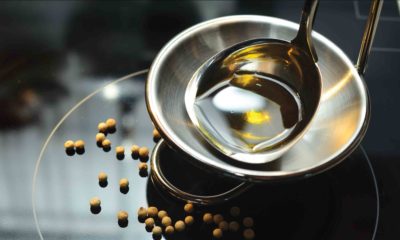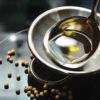
Concentrates
Delta’s Dawn
What you should know about isomers: delta-8 THC, delta-9 THC, delta-10 THC.
Most people over the age of 21 are familiar with the abbreviation “THC,” but odds are, many of them couldn’t tell you what it means or how it works. THC stands for tetrahydrocannabinol, the compound in the cannabis plant that gives you that prototypical euphoric cannabis high.
The cannabis plant also produces THCA, short for tetrahydrocannabinol acid, in the arrangement known as delta-9 THCA. However, the THCA and THC molecules can be forced into other arrangements, called isomers. Delta-9 THC, delta-8 THC and delta-10 THC are all examples of such isomers. A tiny shift in atoms means the molecules all interact with the endocannabinoid system differently, consequently producing different mental and physical effects.

Delta-9 THC is mostly known for its euphoric and intoxicating qualities that lead to that classic cannabis high. Anecdotal reports clearly indicate that delta-9 THC provides consumers with a much stronger and longer-lasting effect than its isomers, delta-8 and delta-10. Delta-8 has been reported to produce a slightly relaxing high that’s short-lived and delta-10 reportedly creates a slight intoxication, but mainly helps to boost energy. But there are potential dangers affiliated with all three delta isomers.
Increasingly, brands across the U.S. are highlighting the various THC isomers featured in their hemp-based products, giving way to increased press and ensuing questions from consumers. Since the passing of the Farm Bill in 2018, CBD and hemp-based products have grown exponentially within the country’s marketplaces. Touting the myriad benefits of hemp and CBD, these products can be found anywhere from Saks Fifth Avenue to the local gas station. The heightened media attention stems from the surfacing of these unfamiliar isomers in hemp products — especially delta-8 THC. To date, hemp products have only included the cannabinoid cannabidiol (CBD), so the presence of THC isomers in hemp products has been extraordinarily controversial.
This leads us to the most logical of questions: How are these companies producing THC isomers from hemp?

Converting Molecules
Delta-9 THC is a non-polar lipid, which is derived from the cannabis plant by way of delta-9-THCA. THC isomers can be naturally found in the cannabis plant; however, cannabis is bred genetically for the production of delta-9-THCA. This means that in order to reach high concentrations of THC isomers (as seen in many of the products entering the hemp market) a delta-9 THC or CBD molecule must undergo a process to convert the compound from delta-9 THC or CBD to delta-8 THC or delta-10 THC.
Basic chemistry, using chemical synthesis or temperature and pressure, can be applied to these molecules to manipulate one into the other. Chemical synthesis can yield much higher concentrations of these isomers at a much higher rate of efficiency than the plant naturally produces. So, hemp and CBD manufacturers are turning to chemical synthesis by using various solvents and acids to synthesize the production of these isomers for their products.
As media coverage sheds light on these processes, industry members, consumers and governmental agencies are becoming increasingly concerned. Their collective lack of understanding related to whether operators are equipped to properly handle these solvents and acids is at the root of all of the hullabaloo surrounding isomers.
Delta-9 THC, delta-8 THC and delta-10 THC are all examples of isomers. A tiny shift in atoms means the molecules all interact with the endocannabinoid system differently, consequently producing different mental and physical effects.
An important step in producing consumer products is ensuring that there are no harmful chemicals in the end product prior to releasing the product to market. Can these manufacturers properly remove all residual solvents from the synthesized product? Are there harmful byproducts being produced and remaining in the final product? Are these operators equipped to test for dangerous chemicals and byproducts?
Without regulation in the hemp and CBD market, manufacturers aren’t required by anyone to test for these residual solvents. Consumer safety is of the utmost importance, everyone surely agrees, yet customers are left unaware of the potential risks involved with these unregulated products.
Potential Risks
Risks of inhaling, ingesting or topically applying products with mid-high concentrations of solvents can result in irritation of the lungs or skin. These risks are compounded by the fact that this chemical synthesis process has jeopardized the success of local, legal cannabis markets.

Investigations are underway as licensed manufacturers in regulated markets have stopped sourcing locally grown THC cannabis biomass and are instead sourcing hemp CBD extract from out-of-state or international sources and converting the CBD from hemp into delta-9 THC. Not only are consumers at risk, but the local regulated cannabis industry is also at risk. Because of this shift in purchasing, small business owners are losing customers, as they’re unable to compete with hemp prices. Additionally, tax dollars that would otherwise be collected from the local suppliers aren’t going to the states they should.
By harnessing the power of chemistry, companies such as Heylo, a Seattle-based licensed cannabis processor, are creating products that highlight the positive effects of THC isomers without utilizing solvents. Heylo’s cannabis oil, The New Workout Plan, has more than 20% delta-10 THC, which is produced from delta-9 THC dominant cannabis plant material, extracted through CO2 extraction, and converted to delta-10 THC.
Some states and legal markets have quickly taken action to ensure delta-9 THC products are produced from legal and regulated sources. This will support the health of the legal medical and recreational markets, but only time will tell how the distribution of CBD and THC isomer products will be affected. Consumer safety is of the utmost importance as this industry is being built. I encourage everyone to be an informed industry member and consumer, and to find products you can trust.
Lo Friesen is an environmental chemist, product developer and botanical extraction thought leader. She’s the Founder/CEO of Heylo, a licensed cannabis processor in the state of Washington.
This story was originally published in the print edition of Cannabis Now. Read it now on the Cannabis Now iTunes app.























